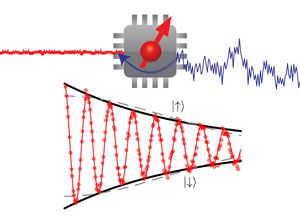May 18 2020
Researchers at RIKEN have found the source of noise that mostly affects the accurate management of data in quantum computers based on semiconductor quantum dots. The study results could help enhance the accuracy of quantum computers.
 Top: Physicists at RIKEN have investigated the effect of canceling low-frequency noise (present in the blue line on the right, but removed from the red line on the left) on the coherence and fidelity of qubits in gallium arsenide quantum dots, which are encoded as electron spin (red arrow). Bottom: The system undergoes coherent oscillations between the spin up and spin down states. Image Credit: © 2020 T. Nakajima et al.
Top: Physicists at RIKEN have investigated the effect of canceling low-frequency noise (present in the blue line on the right, but removed from the red line on the left) on the coherence and fidelity of qubits in gallium arsenide quantum dots, which are encoded as electron spin (red arrow). Bottom: The system undergoes coherent oscillations between the spin up and spin down states. Image Credit: © 2020 T. Nakajima et al.
Quantum computers can solve problems that cannot be solved by traditional computers. Several technologies are being analyzed for the development of quantum computers.
However, manipulation of the spins of single electrons entrapped within small semiconductor blobs called quantum dots is one of the most potential technology, specifically because it can use semiconductor fabrication technology that already exists.
Quantum computers work based on the storage and manipulation of qubits—the quantum equivalent of bits in traditional computers. In semiconductor quantum dots-based computers, a qubit is equivalent to the spin of an electron entrapped within a quantum dot.
The spin of electrons is highly sensitive to its environment, and thus it is essential to maintain its state for the maximum possible time—a parameter called its coherence. Moreover, it is crucial to make sure that operations on the qubit are executed precisely—a parameter known as fidelity. The focus of engineers is to improve both the fidelity and coherence of quantum computers.
It’s generally believed that if you have a good coherence then you can expect a high fidelity. But the relationship between the two parameters wasn’t clear for spin qubits.
Takashi Nakajima, RIKEN Center for Emergent Matter Science
At present, a research team guided by Seigo Tarucha has investigated the effect of canceling the environmental noise’s low-frequency component, which can emerge from heat, control electronics, nuclear spins, and impurities on the fidelity and coherence of spin qubits.
They used a method similar to the one employed in noise-canceling headphones.
Noise-canceling headphones measure the environmental noise and generate a feedback signal to cancel it. We did a similar thing for qubits—we detected the noise in the semiconductor device and then applied a microwave signal to cancel this noise.
Takashi Nakajima, RIKEN Center for Emergent Matter Science
The researchers eliminated almost all of the low-frequency noise. They found that both the coherence and fidelity improved when the low-frequency noise, which predominantly arises from the material’s nuclear spin, is eliminated.
However, although the residual low-frequency noise still influenced the coherence, the high-frequency noise affected fidelity more. Therefore, various methods are required to enhance both fidelity and coherence.
The team discovered that the origin of the high-frequency noise was charge fluctuations in their device.
It came as a surprise because most of the noise was thought to come from nuclear-spin noise in the system.
Takashi Nakajima, RIKEN Center for Emergent Matter Science
Nakajima added that engineers will have to look for ways to minimize the high-frequency noise to enhance the fidelity, and thus the reliability, of calculations.
Journal Reference:
Nakajima, T., et al. (2020) Coherence of a Driven Electron Spin Qubit Actively Decoupled from Quasistatic Noise. Physical Review X. doi.org/10.1103/PhysRevX.10.011060.